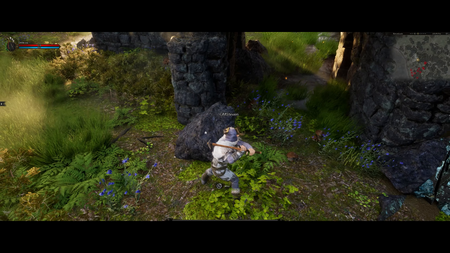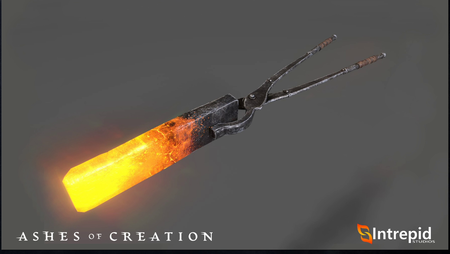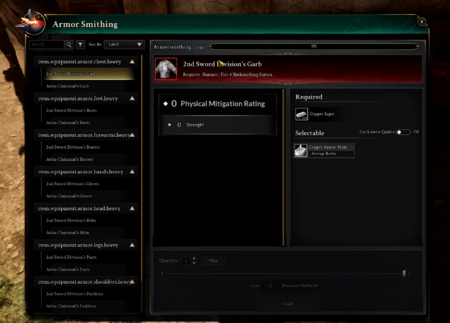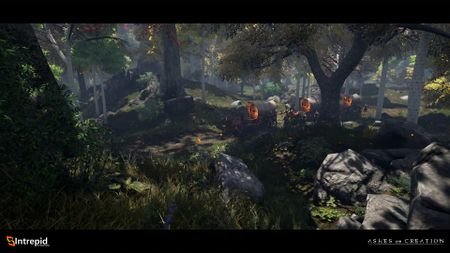Handwerksklassen
| Sammeln professions | Verarbeitung professions | Handwerkskunst professions |
|---|---|---|
Handwerksklassen (also referred to as Artisan branches) allow a player to specialize in one or more of the three artisan skill trees: Sammeln, Verarbeitung, and Handwerkskunst.[1]
- We want players to interact with each other. We want the professions to make stuff for the other professions that are useful. I am influenced quite a bit by the Star Wars Galaxies style crafting; and just having people in your network that could supply the metal that you need to make your armor, and the flowers that you need to make your potions, and maybe the potions that you need to make your enchantments. That to me was really interesting; and part of the economic gameplay of being a good crafter, being a good gatherer, is having that system; and it really plays into the economic field of a particular server. You can come in and be like, I want to be the the potion mogul here; and having good sources and having a guild that supports you is just really interesting. And without narrowing down what you have access to yourself, it takes away from the ability to achieve that.[2] – Kory Rice
Within each of the three artisan classes lies different professions.[3]
- Characters within a single account (Alts) may have different professions.[4][5]
- Q: How do you feel about players creating alts that allow them to cover every profession?
- A: I think that's fine and I think that when we design the game, we design with that in mind as well; and that's why we have certain restrictions on the number of Grandmaster professions that one particular character can do.[4] – Steven Sharif
- Handwerkliche Entwicklung in each profession is per-character.[8][7][9][5]
- Progression within each profession requires the completion of certification quests.[10]
- There are limits to the number of professions a character can achieve certain tiers of progression to.[11]
- Artisan progression does not directly relate to progression in a character's adventuring class, but there are requirements that take into account dangers, locations, toolsets, and surveying options that are level dependent.[12][13][14]
- Characters gain XP as they progress their artisan professions, but it should be expected that some artisans will have significantly higher artisan level than their adventuring level.[15][16][12]
- Choice of profession does not affect a player's stats.[17]
- Handwerksklassen and their professions are not affected by a character's religion, or class.[18][19]
- Race likely won't affect the artisan system.[18][19] Certain influences may instead be housed in a background selection that isn't intrinsically tied to race.[18]
- When it comes to balancing a system that's something that we do during testing phases. When it comes to architecting the system itself and identifying the areas in which certain certain professions excel, where they interact with ancillary systems, their interconnectivity across the artisanship system as a whole, the important part there is to identify how that the interconnectivity lives with the other professions in the artisanship system. And what type of reliance you have on particular professions to complete the path of crafting or introduction of new items into the economy.[7] – Steven Sharif
- A work order system is planned that will help players find artisans in nodes.[20]
Sammeln
The first major reveal is that in Ashes of Creation we have now expanded the resource gathering system to include a great many of what the world is showing you of these resources. So when you see a tree, you can chop a tree. If you see a rock, you can mine a rock.[21] – Steven Sharif
Sammeln is one of the artisan classes in Ashes of Creation.[24][1]
- Many of the visible resources (such as Trees and Ore) in the open world are gatherable.[21]
- The exact type of resource present within a resource node is not known until the node is harvested.[23]
- There's a bunch of different things in Ashes that will be gatherable. We have plants and trees and rocks and fish and animals and creatures that can be tamed; and we're thinking to reach the visual fidelity bar and to have things a little bit more rooted in what we know is that it wouldn't really make sense for you to just see gold all over the world in the same way that you would plants and trees; so we wanted to get feedback on what players think about some of the different gatherable types having different things that you would have to know and expect from them. So rocks are a good example of this, where you can see a rock but until you crack that thing open you don't know if it's full of stone, crystals, rubies, gold. So we wanted to try that out with some of our gatherables to have players have to open this thing up- and that's not to say that we players won't stumble on a nice load, or vein, or geode of gold, but most of the stuff that they would they would find to the world, unless they they look hard enough, would require them to crack that stone open.[23] – Kory Rice
- Gathering is intended to be accessible to both solo and group-based gatherers.[26]
- Gathering requires the creation and use of tools.[27][28]
- Gatherers who complete the gathering interaction first will gain the resources. Gathering speed can be improved as follows:[29]
- Higher levels of artisan progression.[29][30]
- Better quality artisan gear and gathering tools.[29][31][30]
- Surveying plays a key role in helping gatherers identify resources in particular locations.[32][33]
- Gathering within a node's Einflussbereich (ZOI) will contribute to its experience growth.[24]
- Certain low level gatherables will have a tiered progression into higher level crafting.[34]
- Certain low level gatherables will have a tiered progression into higher level crafting. So for example if I'm gathering... leaves of the blue petal flower to craft a pigment that's going to be used in the development of a tunic that I can wear at level one, then I may need to collect those in order to craft the pigments to craft a greater pigment that might be present in the in the crafting of a higher level item. So it's going to be a tiered progression so that materials have relevancy throughout the different levels of of crafting; and that's important from an economic stability standpoint. You need to have layered demand from a supply standpoint so that players who are interested in collecting and gathering those materials still are relevant when the later level items are crafted.[34] – Steven Sharif
Berufe des Sammelns
Gathering tools
Sammler, einer der Handwerksklassen, benötigen bestimmte Werkzeuge um Ressourcen sammeln zu können.[27][28]
- Fortschritt in der Sammler Handwerksklasse schaltet die Benutzung von höher leveligen Werkzeugen frei, was dem Sammler erlaubt Ressourcen von einem höheren Level zu sammeln.[36]
- Ein Sammler, der das maximale Fertigkeitslevel erreicht, schaltet sogenannte Meister Werkzeugsets frei, welche ihm Zugang zu Ressourcen der höchsten Qualität gewähren.[37]
- Werkzeuge haben eine Haltbarkeit und eine Lebensdauer.[37][38]
- Handwerker müssen sich nicht auf andere verlassen um ihre eigenen Werkzeuge zu craften.[27]
Tools do advance within the artisan tree, so your ability to either gather, process or craft will require the equivalent tools necessary at that stage of crafting in order to accomplish the task at hand. So, you could not mine copper and mithril with the same tool.[28] – Steven Sharif
Das Verarbeiten benötigt Blaupausen für Gebäude, welche benötigt werden, um Ressourcen zu verarbeiten.[27]
- Handwerkskunst benötigt den Erwerb von Rezepten um Gegenstände zu craften.[27]
Verarbeitung
Verarbeitung is one of the artisan classes in Ashes of Creation.[39]
- Processing involves the refining of raw materials obtained from gathering and item deconstruction.[39]
- Each processing profession has four processing stations that unlock as players progress.[40][41]
- The bulk of the time spent in the artisan system resides in the processing branch. The processing time varies based on the quality of the crafting materials.[42]
- Processing up to journeyman level can be carried out in nodes.[43][44][48][46][47]
- There will be public spaces in nodes where processing artisans can carry out lower-tier animal husbandry and farming activities.[49]
- The intent is that there are also public spaces where animal husbandry and farming can be utilized... Those systems provide opportunities for players who might be more solo-oriented, aren't a part of a family, don't think they'll be able to acquire a freehold, but still want to participate with those particular particular types of professions. But they may not do it at a mastery level as a result; but they'll still have access to lower-tier versions of that so that they can progress through that particular profession up to a degree.[49] – Steven Sharif
Berufe der Verarbeitung
Processing stations
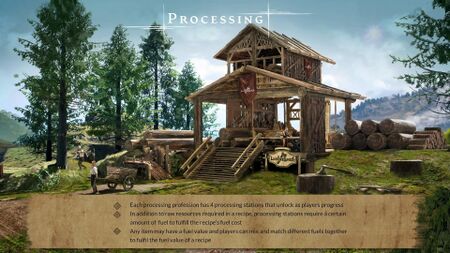
Processing stations are of course a necessary component of taking gatherables into usable crafted goods essentially to fulfill what recipes require in order to make items.[46] – Steven Sharif
We're trying to marry the visuals with what's actually going on with the station. So, if you have a job queued and you're trying to do errands throughout the node, or in your freehold or whatever, [you] should be able to look at the station and know what's going on with it: So you know he's there working and once he's done he's going to stop and you can be like, okay there's stuff ready to pick up and have some visuals associated with that. So, as much as we can have stuff rooted in world instead of throwing a bunch of UI in the player's face, that's something that we're trying to do and is important to us.[51] – Kory Rice
Processing stations are workstations that are used to process raw materials into processed goods (crafting materials) at nodes or on freeholds.[52][53][46][47][42]
- Artisan buildings are required to be placed on freehold (and node) plots to unlock placement of processing stations.[52][41][54]
- Each processing profession has four processing stations that unlock as players progress through their artisan building tech trees.[55][40][41]
- Each processing profession will have four stations; and the stations will come online as you progress through the profession. Each one of those stations will make goods that are immediately useful to the economy, to crafters, to other processors; and each processing station will build on itself and into the other stations.[56] – Kory Rice
- Master and grandmaster processing can only take place on freeholds.[41][45]
- Processing as it stands for Alpha-2's implementation is that there is a certain amount of prep work that's required first for the industry-specific component, which is the building. That prep work might be finding a certain amount of lumber to light the fire in kiln or whatever, to a certain temperature in order for you to process a certain grade of ore; and that grade of ore being malleable then into an ingot; and that produces that ingot so-to-speak. Now, in that process there's a gathering component, there's a preparatory phase, there is a time-related component.[58] – Steven Sharif
- Processing stations have queue slots that allow jobs to be queued at that station.[59] Processing jobs are processed sequentially for all players in freeholds. Processing jobs in nodes are processed sequentially per player, but concurrently with other player's jobs.[60]
- Q: Can you provide more details in regards to the design philosophy behind why it's a queue system for freeholds but not for nodes?
- A: On the freehold, processing can achieve the highest levels of processing. That's where the highest levels of processing occur. Nodes can only go up to a certain level of processing. Now we want to be able to throttle the amount of resources that can be processed at any given time in response to the fluctuation and flows of the economy. So, we want to make sure that the economy is a bigger ship when turning than being able to immediately start processing everything at once and get new resources out as the flow of supply and demand changes within the world. And because- again that's at the highest levels of processing; and you're sharing the available queues that exist at those stations. It's going to take time and it's going to take a long time for the higher level materials.[61] – Steven Sharif
- There will also be time-related and gameplay elements that require the player to interact with processing stations.[59] These elements act to throttle the introduction of processed materials from raw gatherables into the economy.[58]
- There's also possibilities that the machine you're using itself has some type of gameplay layer- should the kiln get overheated, and you have to throw some water on it or something. There are elements there in that process that we want to mimic this gameplay opportunity for players to interact; and not just be a time-sink. But time-sink is also a component of it as well, because that's the throttle for the introduction of processed materials from raw gatherables into the economy.[58] – Steven Sharif
- Processing times, yields, queue times, and job sizes can increase based on node progression, service building upgrades, node policies, and relics.[62][59][42]
- That's going to be very important as you get to very late game processed materials that are required. Because some of these things might have days to process within a station, but if you have spent the time and done the work to advance that processing station you could cut that down considerably, perhaps even greater than 50 percent; and that's going to have a significant impact on your ability to either control markets or to create goods.[42] – Steven Sharif
- Processing stations are distinct from crafting workstations that are used to craft finished goods.[45][53]
- The developers are considering a decay system for processing stations similar to item decay for gear.[63]
- Q: Do processing stations wear out over time? Do they have to be repaired?
- A: That's something that we're still discussing internally. It is coded in such a way where it's an easy variable for us to change that. There are material components that are necessary to feed the machines to keep them up and running, or it could be based on how you interact with the fuel components. If you overheat- overcharge with fuel, that can create like a system degrade similar to your armor decay, which then you have to feed materials in order to rebuild maintenance-wise. Right now it is not implemented. With that in mind, the only maintenance required is going to be through taxation. And depending on the number of permits that you have placed on the freehold will increase the amount of taxes that are necessary to be paid for the freehold.[63] – Steven Sharif
List of processing stations
- Apprentice Crushing Station
- Farms
- Fishery
- Freehold farms
- Metalworking stations
- Mills
- Novice Debarking Station
- Ställe
Handwerkskunst
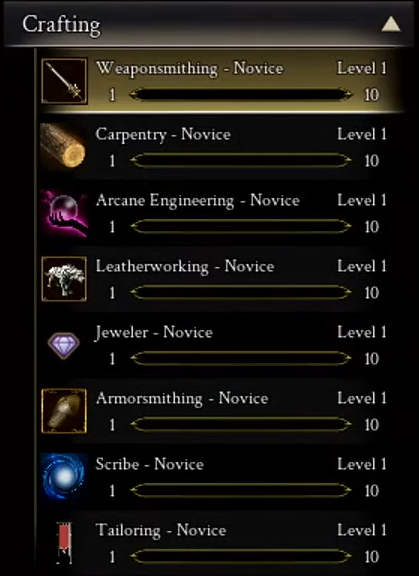
Crafting and gathering is a very important component of the economy that players will have direct control over. Whether you wish to build a sprawling plantation around your house, or wish to travel the vast wilderness in search of treasure and resources. There are many tools available to the crafters of our world. Regardless of how you gather your resources, we believe that every item that exists in the world should in some way reflect its creator. As such, there will be extreme versatility in our crafting system – giving crafters the ability to create unique items that represent their strengths and weaknesses.[65]
Handwerkskunst is one of the artisan classes in Ashes of Creation. It is a driving force for the game economy.[65][66]
- Crafting in Ashes of Creation is recipe-based not RNG based.[67][68][27][69][70]
- Crafting stations are located on freeholds or within nodes.[71][72]
- Higher tier crafting stations are unlocked with node progression.[73]
- Players can only craft up to journeyman level on freeholds.[41]
- Top tier crafting stations are present at all node types, however Academic nodes offer additional bonuses to crafting performed there.[74]
- Artisan gear will enable crafting of stronger items.[75][76]
- Crafting times may vary between professions but the bulk of the time spent in the artisan system resides in the processing branch.[42]
- Not every crafting profession is able to craft consumables.[77]
- The developers are seeking feedback on the addition of a gameplay layer to crafting that determines the outcome based on the player's performance.[78][79]
- The developers are debating whether this occurs on a craft-by-craft basis or a one-off basis following after a new level of certification has been achieved.[78]
- This will be revealed when it is ready to be showcased.[78]
- There will not be a labor or energy system in Ashes of Creation.[80]
- There is no labor or energy system in Ashes. However, that's not to say that crafting will not be difficult. Crafting is very difficult; but it is because it is difficult that it will be very rewarding as well.[80] – Steven Sharif
Berufe der Handwerkskunst
Rezepte
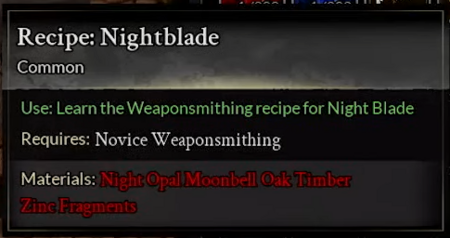
When players are looking to create different items in the game they're going to need to go out and either purchase, or get drops of recipes, or trade with other players; and when they acquire that recipe, like I have here: it says Nightblade. I can use the recipe and I will learn a Weaponsmithing recipe for the Nightblade. So, I have a recipe book that I get to keep. Essentially I learn these recipes once.[68] – Steven Sharif
Handwerkskunst in Ashes of Creation is recipe (blueprint, schematic) based, not RNG based.[67][68][27][69][70]
- Recipes that are obtained must be committed to a player's recipe book (by right-clicking on the recipe item). This "consumes" the recipe item and unlocks the ability to craft the item in question.[68][82]
- Artisans must have the required artisan certification to learn recipes at that level (or lower).[83]
- Recipes can be traded or sold prior to them being committed into a player's recipe book.[82]
- In most cases learned recipes are permanently added to a character's recipe book, but in certain unique cases there will be a "charge count" where learned recipes will disappear from the recipe book after a number of uses.[68]
- Once a recipe is learned, it cannot be shared with other characters, including alts.[84]
- Rezepte have slots for required and selectable crafting materials. Adding higher rarity selectable materials increases the rarity of the crafted item.[67][85][86][87][88] Choosing different selectable materials can also result in crafted items with different statblocks and unique properties.[89][90]
- These are the things we want to explore on [the] crafting side, where we introduce maybe new stat lines, or a different proportion or ratios of stats at certain tiers; and when you craft these items using better materials, the rarity of the item increases. For demonstration purposes we're using legendary, but basically when you use a higher tier than the recipe is intended for- so we could technically build this item with common copper and zinc fragments, then that would produce an uncommon item. But, since we're showcasing this at legendary tier, you can move up the tiers and have the stats increase.[87] – Mike Han
- Recipes may have an XP component, where crafting that recipe multiple times can level up the recipe and unlock better results.[85][92]
- Something unique in our crafting system [is] where we want to have recipe XP of some sort; and then those sub-recipes could [be] earned by leveling up your recipe, which means that you have to craft the Nightblade multiple times to level it up to have a better result. The sub-recipe could be from a vendor recipe or world drops like we said earlier, but the idea is one type of item can have potential to be multiple different outcomes.[92] – Mike Han
- While selectable materials offer a wide degree of customization, crafting results must lie broadly within the realms of the recipe's definition; and so cannot be arbitrarily customized.[93][91][94]
- Q: Will players have the ability to innovate within the crafting system creating unique items or designs? If so, how much customization can players expect when it comes to crafting their own gear or items?
- A: There are statically defined an array of results that can come out of a particular recipe; and your ability to unlock those results is predicated on what composition of resources you contribute to crafting that particular weapon type; and so in that sense, yes crafters will have the ability to uniquely create certain types of the recipes results, based on how they're contributing resources to it. The result has to have a corresponding recipe definition; and so in that sense it isn't completely customizable to the point where the player gets to uniquely create these particular items, but rather they are discovering what creations are possible with each recipe type.[93] – Steven Sharif
Crafting stations
There's going to be a number of different types of selectables that you can incorporate as part of the crafting process; each of them having unique results as part of the stat block for the weapon, but also increasing the quality, predicated on the quality of the selectable that you're contributing.[89] – Steven Sharif
Crafting stations (also referred to as Crafting benches) are workstations located on freeholds or within nodes.[52][53][46][71][72]
- Rezepte have slots for required and selectable crafting materials. Adding higher rarity selectable materials increases the rarity of the crafted item.[86][87][88] Choosing different selectable items can also result in crafted items with different statblocks and unique properties.[89]
- Different tiers of crafting stations represent the quality of the items that can be crafted.[71]
- Higher tier crafting stations are unlocked with node progression.[73]
- Großstadt (Stufe 5) nodes may have one Grandmaster crafting station.[96]
- Metropole (Stufe 6) nodes may have two Grandmaster crafting stations.[96]
- Players can only craft up to journeyman level on freeholds.[41]
- Upper-tier crafting benches within a node are accessible by its citizens.[97]
- Top tier crafting stations are present at all node types, however Academic nodes offer additional bonuses to crafting performed there.[74]
- Higher tier crafting stations are unlocked with node progression.[73]
- Crafting stations can pull inventory from a player's personal storage and warehouse storage from the node that the crafting station is in.[98]
- There is no limit to the number of players that can use a crafting station at the same time.[59]
- Crafting stations are distinct from processing stations, which are used to process raw materials into processed goods (crafting materials) at nodes or on freeholds.[53][46][47][42]
- Q: Can crafting stations be mobilized / moved and can they be placed anywhere in the world?
- A: It depends on the crafting station. There are going to be different tiers of crafting stations that represent the quality of item you're looking to create within that specific profession. There's going to be crafting stations that can be utilized by players within their freeholds and then crafting stations that are resigned only to the development of particular nodes, within particular areas, or particular buildings... There's a wide variety of those things to make it a more dynamic experience and something that caveat how players decide to build the world and what the value of those things are.[71] – Steven Sharif
- Legendary crafting benches are present in the Akademie unique building of Metropole (Stufe 6) Academic nodes.[99]
List of crafting stations
- Armor smithing stations
- Hideworks
- Laboratories
- Ship workstations
- Smithies
- Stoneworks
- Textile mills
- Weapon smithing stations
- Woodshops
Handwerkliche Entwicklung
| Artisan level | Artisan certification | Profession limit per character |
|---|---|---|
| 0-10.[101] | Novice.[11][64] | 22.[11][100] |
| 10-20.[102][101] | Apprentice.[11] | 5.[11][100] |
| 20-30.[102] | Journeyman.[11][41] | 4.[11][100] |
| 30-40.[102] | Master.[11][41] | 3.[11][100] |
| 40-50.[102][103] | Grandmaster.[11][41] | 2.[11][104][100] |
Die Handwerkliche Entwicklung erfolgt auf der Grundlage von Erfahrung (Wiederholung von Aufgaben) sowie dem Erreichen bestimmter Benchmarks innerhalb jedes handwerklichen Zweigs (Sammeln, Verarbeitung und Handwerkskunst).[106] Der Fortschritt in jedem Handwerksberuf erfolgt pro-Charakter.[8][7][9][5]
- In allen 22 Berufen können die Spieler Anfänger sein; und dann beginnt es von da an enger zu werden. Danach können Sie nur noch fünf Dinge lernen. In vier Dingen kann man Geselle sein. Sie können in drei Dingen ein Meister sein; und man kann in zwei Dingen ein Großmeister sein. Sie müssen sich also eingrenzen, können aber auch diversifizieren, um die Berufe zu unterstützen, die Sie zunächst weiter vorantreiben möchten. [100] – Kory Rice
- Der Aufstieg zu jeder „Stufe“ innerhalb eines Berufs gewährt Skillpunkte, die im Handwerker-Skillbaum eines Charakters verwendet werden können. [108]
- Handwerker-Zertifizierungsquests müssen abgeschlossen werden, um Kenntnisse in dieser Stufe des Handwerker-Fortschritts zu erlangen. [10] Durch den Abschluss der Zertifizierung werden Vorteile für diesen Beruf freigeschaltet, beispielsweise handwerkliche Werkzeuge für Sammel-Berufe. [16]
- Die Anzahl der Berufe auf jeder Zertifizierungsstufe in den drei Handwerkszweigen ist limitiert. [11][104][109][100][110] Zum Beispiel: Ein Charakter darf in allen Handwerkszweigen immer nur Meister in bis zu 3 Berufen und Großmeister in bis zu 2 Berufen. [11][104]
- Großmeister Handwerker können ihren gesamten Berufsfähigkeitsbaum ausschöpfen, aber ein Charakter kann nur Großmeister von bis zu zwei Berufen sein. [111]
- Das Erreichen einer Handwerkszertifizierung in einem Beruf bedeutet auch, dass der Charakter bis zu diesem Zeitpunkt auch alle niedrigeren Zertifizierungen erhalten hat. [112]
- Wenn du in diesem Beruf Großmeister bist, kannst du den gesamten Baum maximieren. Aber man kann nur zwei Dinge großartig meistern.[111] – Kory Rice
- Durch die Auswahl eines bestimmten Pfads im Fertigkeitsbaum hat der Spieler die Möglichkeit, sich auf einen bestimmten Bereich zu spezialisieren. Dies fördert die gegenseitige Abhängigkeit, der Spieler und verbessert das handwerkliche Erlebnis.[113]
- Der Fortschritt innerhalb der Handwerksklassen steht nicht im direkten Zusammenhang mit dem Fortschritt der Abenteuerklasse,
eines Charakters, es gibt jedoch Anforderungen, die Gefahren, Orte, Werkzeugsets, und Vermessungsptionen berücksichtigen, die von dem Abenteurer-Level abhängen. [12][13][14]
- Q: In Bezug auf die Charakterstufe und die Handwerkerstufe. Wir wissen, dass es derzeit zwei verschiedene Dinge gibt. Was hindert einen Spieler jedoch daran, auf Stufe eins zu bleiben und sich mit einem Spieler der Stufe 50 zusammenzuschließen, um dann Ressourcen der Stufe 50 in den hohen Zonen zu sammeln? Auf diese Weise muss jeder, der diese Ressourcen an sich nehmen möchte, den Sammler auf Stufe eins töten und erhält eine große Menge Korruption für das Töten eines Stufe-1-Sammlers als Stufe 50?
- A: Das Sammeln höherstufiger Ressourcen erfordert einen erheblichen Fortschritt innerhalb eines bestimmten Berufs für diese sammelbare Ressource. Wenn ich also ein Bergmann bin und Zugang zu den höchstmöglichen Mineralien haben möchte, muss ich ein Meisterbergmann sein; Und um den Master-Minor-Status zu erreichen, werde ich durch diesen Prozess Abenteuererfahrung sammeln, denn viele dieser Questreihen, viele dieser Erfolge werden durch Questreihen ermöglicht. Einige dieser Questreihen sind mit Abenteuerschwierigkeiten verbunden, die auf bestimmten Ebenen in der Wildnis vorkommen. Das wird also ein Prädikat für mich sein – das wird ein Prädikat dafür sein, dass ich ein bestimmtes Level erreiche, um einige dieser Questreihen abzuschließen und den Meisterstatus zu erreichen. Ihr werdet also wahrscheinlich nicht die Fähigkeit eines Level-1-Alt-Charakters sehen, der Zugriff auf hochstufigen Mineralienabbau oder andere Arten von Sammlerstücken hat[12] – Steven Sharif
Artisan mastery
A character may only ever be a Master in up to 3 professions and Grandmaster in up to 2 professions across all artisan branches.[11][104]
- Artisan mastery is no longer restricted to a single branch.[104]
- Characters may change which professions they master.[114]
- Becoming a master Crafter or a master Processor or a master Gatherer should be a significant time investment and resource investment; and because of that it should also be something that when you achieve that status it's like people on the server know who you are.[115] – Steven Sharif
- Masteries aren’t just about making an item. They grant many things, including titles, access to items, bargains, and quests. [116]
- Previously it was stated that with considerable effort a player can master all professions within a mastered parent artisan class.[3][117] This was later changed to a player being able to master some but not all professions within a mastered parent artisan class.[118][119] This was changed to being able to master up to two or three professions within a mastered parent artisan class (subject to testing).[7] This was changed to being able to master up to two professions.[8] The current stance is only being able to become a Master of 3 professions and Grandmaster of 2 professions across all branches.[11][104]
- Q: What would be the daily activities for someone at level 50 with a maxed out artisan tree?
- A: The daily activity might be something along the lines of, depending on what type of profession or processor you are, of interacting with fellow artisanship individuals to wheel and deal on supply and demand chains; orchestrating and participating and caravan roads that move materials across the world so that you can satisfy buy orders and/or commission requests. Participating in unique trades and/or dungeon experiences that have the opportunity to acquire unique crafting materials so that you can create the dragon's legendary sword and sell that potentially. Finding unique harvestable materials in remote parts of the world or engaging in treasure map finding for again unique materials and/or processing things. There's a whole host of different intents that are loops for the players to participate in that again are situationally relevant based on the world state.[120] – Steven Sharif
Artisan gear
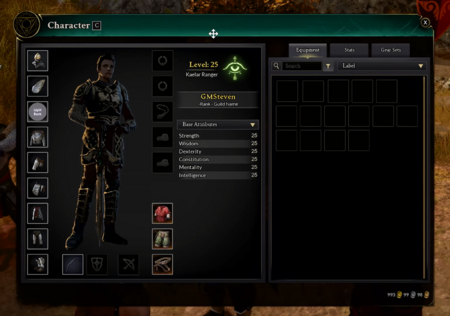
There's gear for all of the different crafting, gathering, and processing professions that'll help you do those different trades.[122] – Kory Rice
Artisan gear boosts artisans in their gathering, processing, or crafting professions.[122][75][76]
- Profession NPCs sell lower level artisan gear.[123] Higher level gear is crafted by players.[75]
- There are three artisan gear slots on a character's paper doll UI.[121] Previously these was referred to as undergarment slots.[75]
- Artisan gear and adventuring gear do not need to be swapped for either to be effective when they are equipped on a character, but players will be able to toggle gear visibility between their adventuring and artisan gear.[124][121][75]
- If you want to be seen as wearing the herbalists outfit, you're still going to have your adventuring gear present and on the character, and benefiting from the stats that are conferred by them; and vice-versa.[124] – Steven Sharif
- Gathering tools and artisan gear have stats that affect gathering rates and yields.[31][30]
- Gear for artisans are going to live alongside your adventuring gear. So you will currently- the approaches, and we'll test this but currently- the approach is you'll have artisanship oriented gear. This might be beneficial for your gathering; it might be beneficial for your processing, or crafting, or whatever it is- your profession. Essentially you will craft that gear, you will equip that gear, it'll live almost as a undergarment slot so to speak; and then you can activate that and it will show the appearance if you wish during the activation when you gain the benefit from the from the gear itself; and then could disappear afterwards and go back to your adventuring gear. That's the current approach. We're going to play with that a little bit. There's some discussion and disagreement on the team about how we do that, but our hopes are for Alpha two, we will have I think a couple of sets at least. We're demonstrating all of the artisanship from gathering to processing to crafting in limited fashion in Alpha 2 want to have that gear present to play with this approach.[75] – Steven Sharif
Work orders
A work order system is planned that will help players find artisans in nodes.[20]
Handwerkliche Lieferkette
Artisans within Ashes of Creation must choose a path in their artisan skill tree. This inter-dependency establishes a supply chain from raw materials to finished product.[125][126] Each stage of the chain may require caravans to transport goods from one artisan to another.[113]
- Obtaining raw materials:[127]
- Refining the raw materials with the Verarbeitung profession.[126]
- Handwerkskunst the finished product using its crafting recipe.[126]
As a crafter you're going to want to know where certain recipes can be fulfilled; which nodes have the capability of creating what you've processed material that you've gathered for; and then you're going to want to plan out your route to either transit the goods there or make sure that you're situated in the area so that you can go out collect and build in that area as well. So there's a lot of planning that's going to be necessary.[130] – Steven Sharif
Zeitplan
Handwerksklassen (Sammeln, Verarbeitung, Handwerkskunst) is expected to come online fully in Alpha-2 and the Betas.[131][132]
- Approximately 10 percent of the artisan system was online in Alpha-1.[133][131][132]
- Crafting honestly will not come online in any sense of its true form until Alpha-2. Alpha-1 has essentially what are intended to be the core gameplay loop of crafting, meaning the collection of materials, the translation of those materials into processed goods, and the use of those processed goods into item acquisition. That's the core gameplay loop that is currently present in Alpha-1. But those are mostly facilitated piggy backing the merchant systems right now and not actually using the real crafting system; and that's because crafting hasn't been completed in a form that can be implemented in Alpha-1, but will be for Alpha-2. What's present in Alpha-1 doesn't even really scratch the surface for crafting.[132] – Steven Sharif
Bildmaterial
Siehe auch
Community guides
Einzelnachweise
- ↑ 1.0 1.1

- ↑ Video, 2023-11-30 (38:08).
- ↑ 3.0 3.1

- ↑ 4.0 4.1 Liveübertragung, 2023-11-30 (1:34:25).
- ↑ 5.0 5.1 5.2 Liveübertragung, 2017-05-24 (32:07).
- ↑ Podcast, 2021-04-11 (44:29).
- ↑ 7.0 7.1 7.2 7.3 7.4 Liveübertragung, 2022-04-29 (1:13:00).
- ↑ 8.0 8.1 8.2

- ↑ 9.0 9.1 Liveübertragung, 2019-07-26 (1:09:46).
- ↑ 10.0 10.1 Video, 2023-11-30 (16:40).
- ↑ 11.00 11.01 11.02 11.03 11.04 11.05 11.06 11.07 11.08 11.09 11.10 11.11 11.12 11.13 11.14 11.15 11.16

- ↑ 12.0 12.1 12.2 12.3 12.4 Liveübertragung, 2023-04-07 (1:00:55).
- ↑ 13.0 13.1 Liveübertragung, 2022-10-28 (1:32:38).
- ↑ 14.0 14.1 Liveübertragung, 2020-07-31 (1:31:11).
- ↑ 15.0 15.1 15.2 Podcast, 2023-12-03 (15:05).
- ↑ 16.0 16.1 16.2 Video, 2023-11-30 (36:00).
- ↑ Liveübertragung, 2017-07-18 (37:25).
- ↑ 18.0 18.1 18.2 Liveübertragung, 2023-02-24 (1:18:05).
- ↑ 19.0 19.1 Liveübertragung, 2020-08-28 (2:05:21).
- ↑ 20.0 20.1 Podcast, 2023-12-03 (16:06).
- ↑ 21.0 21.1 21.2 21.3 Video, 2022-10-28 (0:47).
- ↑ Video, 2022-10-28 (12:31).
- ↑ 23.0 23.1 23.2 Video, 2022-10-28 (9:19).
- ↑ 24.0 24.1 24.2 Liveübertragung, 2017-09-03 (10:48).
- ↑ Liveübertragung, 2021-07-30 (1:11:58).
- ↑ Liveübertragung, 2023-11-30 (1:58:35).
- ↑ 27.0 27.1 27.2 27.3 27.4 27.5 27.6 Interview, 2020-03-27 (9:00).
- ↑ 28.0 28.1 28.2 Interview, 2018-05-11 (38:25).
- ↑ 29.0 29.1 29.2 Liveübertragung, 2023-12-19 (1:53:02).
- ↑ 30.0 30.1 30.2 Video, 2022-10-28 (26:14).
- ↑ 31.0 31.1 Video, 2023-06-30 (3:14).
- ↑ Video, 2022-10-28 (10:52).
- ↑ Liveübertragung, 2022-04-29 (25:16).
- ↑ 34.0 34.1 Podcast, 2018-05-11 (1:00:07).
- ↑ Liveübertragung, 2020-04-30 (54:33).
- ↑ Liveübertragung, 2020-04-30 (53:11).
- ↑ 37.0 37.1 37.2 Liveübertragung, 2020-07-31 (1:05:58).
- ↑ 38.0 38.1

- ↑ 39.0 39.1 Liveübertragung, 2017-05-05 (34:15).
- ↑ 40.0 40.1 Liveübertragung, 2023-06-30 (33:26).
- ↑ 41.00 41.01 41.02 41.03 41.04 41.05 41.06 41.07 41.08 41.09 41.10 41.11 41.12 41.13 Development Update with Freehold Preview.
- ↑ 42.0 42.1 42.2 42.3 42.4 42.5 Podcast, 2021-04-11 (40:20).
- ↑ 43.0 43.1 Video, 2023-11-30 (49:24).
- ↑ 44.0 44.1 Video, 2023-11-30 (44:18).
- ↑ 45.0 45.1 45.2 45.3 Video, 2023-06-30 (16:02).
- ↑ 46.0 46.1 46.2 46.3 46.4 46.5 Liveübertragung, 2023-04-07 (31:49).
- ↑ 47.0 47.1 47.2 47.3 Liveübertragung, 2022-06-30 (1:08:02).
- ↑

- ↑ 49.0 49.1 Interview, 2023-07-09 (51:26).
- ↑ Video, 2023-11-30 (46:59).
- ↑ 51.0 51.1 Video, 2023-11-30 (48:22).
- ↑ 52.0 52.1 52.2 Blog: Exploring the Boundless Opportunities of Freeholds.
- ↑ 53.0 53.1 53.2 53.3

- ↑ Video, 2023-06-30 (15:34).
- ↑ Interview, 2023-07-09 (33:55).
- ↑ Liveübertragung, 2023-06-30 (37:30).
- ↑ 57.0 57.1 Liveübertragung, 2023-06-30 (38:18).
- ↑ 58.0 58.1 58.2 58.3 Liveübertragung, 2022-02-25 (1:12:27).
- ↑ 59.0 59.1 59.2 59.3 Liveübertragung, 2023-11-30 (1:26:16).
- ↑ Video, 2023-11-30 (39:15).
- ↑ Liveübertragung, 2023-11-30 (1:28:10).
- ↑ Video, 2023-11-30 (43:43).
- ↑ 63.0 63.1 Interview, 2023-07-09 (54:46).
- ↑ 64.0 64.1 Liveübertragung, 2023-06-30 (50:07).
- ↑ 65.0 65.1 About Ashes of Creation.
- ↑
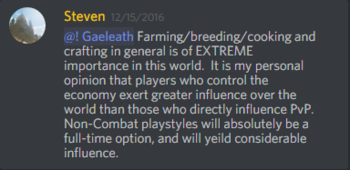
- ↑ 67.0 67.1 67.2 Liveübertragung, 2023-11-30 (1:58:55).
- ↑ 68.0 68.1 68.2 68.3 68.4 Video, 2023-11-30 (3:49).
- ↑ 69.0 69.1 Liveübertragung, 2017-05-05 (20:41).
- ↑ 70.0 70.1

- ↑ 71.0 71.1 71.2 71.3 Liveübertragung, 2020-01-30 (1:38:26).
- ↑ 72.0 72.1 Liveübertragung, 2017-05-12 (1:00:18).
- ↑ 73.0 73.1 Interview, 2020-07-19 (6:38).
- ↑ 74.0 74.1 Liveübertragung, 2023-12-19 (1:50:51).
- ↑ 75.0 75.1 75.2 75.3 75.4 75.5 75.6 Liveübertragung, 2022-06-30 (1:17:34).
- ↑ 76.0 76.1 Liveübertragung, 2021-03-26 (1:06:50).
- ↑ Liveübertragung, 2023-11-30 (2:00:22).
- ↑ 78.0 78.1 78.2 Liveübertragung, 2023-11-30 (1:40:11).
- ↑ Liveübertragung, 2022-10-14 (35:22).
- ↑ 80.0 80.1 Interview, 2018-10-20 (2:31:39).
- ↑ Video, 2023-11-30 (3:15).
- ↑ 82.0 82.1 Interview, 2021-02-07 (37:26).
- ↑ Podcast, 2023-12-03 (17:10).
- ↑ Liveübertragung, 2023-11-30 (1:57:38).
- ↑ 85.0 85.1 Liveübertragung, 2023-11-30 (1:54:37).
- ↑ 86.0 86.1 Liveübertragung, 2023-11-30 (1:38:47).
- ↑ 87.0 87.1 87.2 87.3 Video, 2023-11-30 (59:21).
- ↑ 88.0 88.1 Interview, 2018-10-20 (17:31).
- ↑ 89.0 89.1 89.2 Video, 2023-11-30 (1:01:04).
- ↑ Liveübertragung, 2017-05-26 (5:25).
- ↑ 91.0 91.1 Liveübertragung, 2022-01-28 (1:19:48).
- ↑ 92.0 92.1 Video, 2023-11-30 (1:02:15).
- ↑ 93.0 93.1 Liveübertragung, 2023-11-30 (1:56:01).
- ↑ Interview, 2021-02-07 (38:15).
- ↑ Video, 2023-08-31 (45:06).
- ↑ 96.0 96.1 Liveübertragung, 2023-12-19 (1:49:28).
- ↑ Podcast, 2021-09-29 (4:43).
- ↑ Liveübertragung, 2022-07-29 (1:17:33).
- ↑ Blog: Know Your Nodes - Scientific Node Type
- ↑ 100.0 100.1 100.2 100.3 100.4 100.5 100.6 100.7 100.8 100.9 Video, 2023-11-30 (37:12).
- ↑ 101.0 101.1 Video, 2023-11-30 (9:36).
- ↑ 102.0 102.1 102.2 102.3 Podcast, 2023-12-03 (14:14).
- ↑ Podcast, 2023-12-03 (2:53).
- ↑ 104.0 104.1 104.2 104.3 104.4 104.5
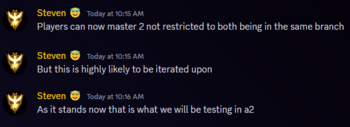
- ↑ Video, 2023-11-30 (23:20).
- ↑ Interview, 2021-02-07 (36:38).
- ↑ Podcast, 2023-12-03 (10:22).
- ↑ Video, 2023-11-30 (26:38).
- ↑
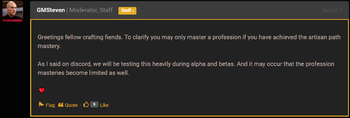
- ↑

- ↑ 111.0 111.1 Podcast, 2023-12-03 (6:23).
- ↑

- ↑ 113.0 113.1 Liveübertragung, 2017-05-10 (6:12).
- ↑

- ↑ Interview, 2020-07-20 (18:47).
- ↑

- ↑
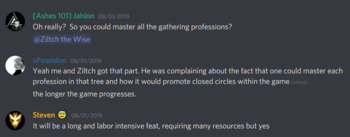
- ↑

- ↑

- ↑ Interview, 2023-07-09 (42:51).
- ↑ 121.0 121.1 121.2 Video, 2023-11-30 (19:06).
- ↑ 122.0 122.1 Video, 2023-11-30 (5:47).
- ↑ Video, 2023-11-30 (12:05).
- ↑ 124.0 124.1 Liveübertragung, 2023-11-30 (1:37:49).
- ↑ Interview, 2020-07-20 (20:17).
- ↑ 126.0 126.1 126.2 126.3 Liveübertragung, 2017-05-10 (8:22).
- ↑ 127.0 127.1 127.2 127.3 127.4 Liveübertragung, 2017-05-08 (20:41).
- ↑ Liveübertragung, 2017-07-18 (38:30).
- ↑ Liveübertragung, 2017-05-26 (26:00).
- ↑ Interview, 2018-05-11 (24:18).
- ↑ 131.0 131.1 Liveübertragung, 2021-03-26 (42:28).
- ↑ 132.0 132.1 132.2 Interview, 2021-02-07 (35:30).
- ↑ Liveübertragung, 2021-04-30 (41:18).
